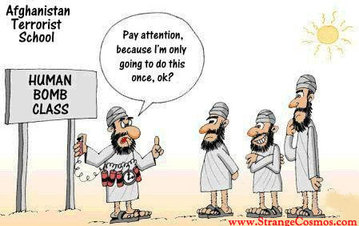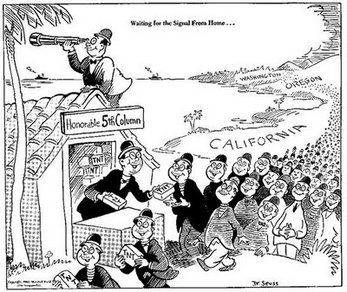 Stand-up comedians exercise a curious privilege, which allows them to peddle controversial conclusions and uncomfortable insights without suffering the usual scorn and admonishment that comes with challenging systems of power. The comedian's stage seems to be a space that has been engineered for bringing indelicate knowledge about the world to the surface. For instance, the suggestion that Americans are deeply divided by race and class usually causes people to fidget, yet Chris Rock was greeted with laughter and applause when he unabashedly criticized the racialized wealth gap in the United States during one of his performances in Washington DC. Similarly, Louis C.K. received a rousing applause when he discussed his privilege as a white male, and Hari Kondabolu made an entire room burst into laughter by exposing the nonsensical logic underlying stereotypes aimed at Mexican immigrants. Unfortunately, as with superheroes who use their powers for evil, not all comedians use the stage as a venue for delivering social criticisms aimed at exposing injustice. For instance, comedy is just as likely to reinforce stereotypes as it is to criticize them, or to put it differently, the comedian's stage is just as likely to be a place where knowledge is "indelicate" because it is racist as it to be a place where knowledge is indelicate because it is critical of racism. Consider Jeff Dunham's ventriloquial act featuring his popular dummy, "Achmed the Dead Terrorist." In the clip below, which is taken from a 2007 performance in Washington DC, Dunham draws upon a number of stereotypes of Arabs and Muslims, many of which have been around since well before the attacks on September 11th, 2001. Dunham is not deploying social criticism, but is instead uncritically drawing on racist representations for laughs. He is also reasserting and promoting what is by now a worn panoply of orientalist associations. Arabs and Muslims, like the Achmed character, are typically portrayed as religious fanatics. They are often depicted as irrationally angry, and many are self-proclaimed terrorists. But if they are dangerous, they are dangerous buffoons and are often too incompetent to pull off their own deadly plots. In this way, stand-up comedians can be understood as articulators of knowledge about the world. As I have argued, they contribute to the persistence of stereotypes at times, but they can also articulate convincing arguments against stereotypes. But what is true of stand-up comedy seems to hold for other types of comedic performance as well. Political cartoons, comedy sketches, and even situation comedies all peddle this indelicate knowledge about the racialized other. In "Ali-Baba Bound," a Looney Tunes cartoon from 1940, Porky Pig runs up against Ali-Baba and his "Dirty Sleeves." The humor is constructed around a basic scaffolding of the Arab as dirty and sneaky. Ali-Baba's Arab underlings in the cartoon are depicted as too primitive to competently use rockets and must must run as suicide bombers toward a colonial fort with explosives strapped to their heads. The articulation and reinforcement of Arabs as buffoons or Muslims as extremists, the elevation of these images above others as iconic representations ironically limits the field of vision. But shortly after 1940, events would transpire so that for a time Arabs and Muslims occupied a relatively small sliver of American concern. The sneak attack on Pearl Harbor the following year ignited a discursive explosion surrounding the Japanese, both those living in American neighborhoods and abroad. It is striking how eerily similar representations of Japanese persons were to those claimed for Arabs and Muslims. However, fed by photographed destruction of Pearl Harbor and the tangible realities associated with the American war machine shifted back into high gear, dominant representations of the treacherous Japanese other went further and faster. Each representation of the "Jap" became more and more fanciful; each illustration seemingly emboldened by the last to push the caricature even further.  "Waiting for the Signal from Home..." Dr. Seuss. February 13, 1942 Celebrated children's author, Dr. Seuss, published a cartoon only weeks before the United States would forcibly relocate 120,000 ethnic Japanese persons living in the United States to internment camps. The cartoon depicts a buck-toothed, fifth column of Japanese Americans lining up from Washington to California for their very own box of TNT. A man with a monocular scales the rooftop of the explosives depot "waiting for the signal from home." Or consider a Looney Tunes cartoon from the period, which is named "Tokio Jokio" and similarly claims buck teeth and buffoonish behavior for all Japanese persons on the planet. The cartoon elaborates upon many of the typical stereotypes associated with Japanese persons but unlike the Dr. Seuss cartoon, the attempt at humor is harder to miss. Whereas the Seuss cartoon reverberates extant fears about a treacherous Japanese enemy living among us, the Looney Tunes cartoon lampoons them as bumbling idiots. In the Seuss cartoon, their tribal-like loyalties to the Emperor mean they are capable of doing just about anything, but in the Looney Tunes cartoon they are too incompetent to prevent their own Fire Prevention Headquarters from burning to the ground. Such seemingly contradictory representations permeated the American imagination of the time, alternately stoking anxieties while assuring Americans of their national and even racial superiority. These racist representations aimed at the Japanese were not buried by the detonation of two atomic bombs over Japanese cities. Just as before the Second World War, they have proven to be free-floating to a degree and transferable to our emergent enemies. Today, Arabs and Muslims are routinely depicted in popular cinema as incompetent. In our comedy, they are again the bumbling idiots, simultaneously too stupid to successfully perpetrate an attack against us and just stupid enough to commit truly heinous crimes. What was an imagined fifth column, has become the terrorist sleeper cell. In 1942 we feared Japanese Americans were blindly loyal to "their" Emperor. Today we are bombarded with ideas about the tribal loyalties of American Muslims. So powerful are these loyalties, it is often suggested, Muslims would happily kill themselves to bring about the demise of Western civilization. The fanatical Middle Eastern suicide bomber is the new banzai charger and Japanese Kamikazi pilot. There is a joke that is now getting tossed around the internet, and it goes something like this, "A friend of mine has started a new business. He is manufacturing land mines that look like prayer mats. It's doing well. He says prophets are going through the roof." What this joke, Dunham's comedy sketch, and the Looney Tunes cartoon all share is that they mark historical moments when the racialized other became so thoroughly demonized and devalued in the public consciousness, our undifferentiated Arab "enemies" became so feared for their treachery and immorality that it became possible to make light of hypothetical and real violence perpetrated against them. What does it say about a people when they find it possible to laugh at a joke about a human detonating a bomb which is strapped to his body? One might speculate that it is strangely intoxicating to spot the boogieman tripping on his shoelaces, embarrassing himself, or dying by his own venom. The Achmed character's tired threat, "I kill you!" is funny, perhaps because his voice cracks like a thirteen-year-old boy, and we are entertained by the irony that someone so evil could appear so weak. "Look at the Muslim boogieman acting so foolishly!" we seem to be saying through our laughter. Of course Arabs and Muslims are not born evil; the boogieman is a creature that gets created in the accounts of what might happen if the nation ceases being vigilant. But the larger point I am arguing is that comedy, which uncritically trades in the negative stereotypes aimed at Arabs and Muslims and is able to make an audience pop with laughter with references to suicide bombing, is only possible because Arabs and Muslims have been successfully demonized and devalued. Comedians write jokes to get laughs, but as I mentioned at the outset, they also operate from a space which grants them temporary license to openly discuss controversial ideas. Comedians contribute to the discourse, just as readily they respond to it, and their sets are just as capable of exposing hidden discrimination as reinforcing it. This is important to consider because what is at stake here is the differential valuing of human life, and the way representations are organized to aid in that horrific project. Perhaps five hundred years from now, when historians are able to look back on this moment, freed from the myopic principles of vision and division that currently ensnare us, I wonder if they will find it ironic that during this zenith of global information flows, a time when information about the intimate lives of people in distant lands so easily zipped across the planet, Americans persisted in holding fast to such gross generalizations. And if those historians archive the media which depicts the moral panic of these decades, they would do well to note what made us laugh. Lester Andrist
14 Comments
|
.
.
Tags
All
|
 RSS Feed
RSS Feed